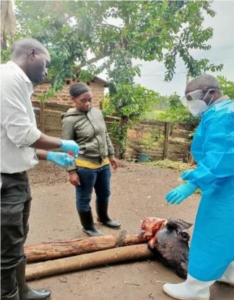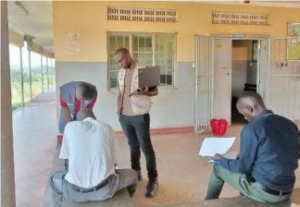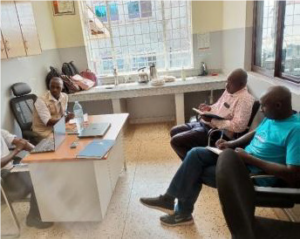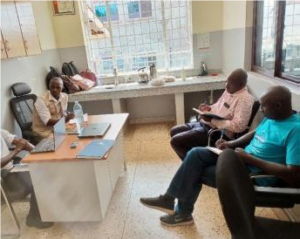 |
Shem MwebazaBBLT (MUK), MSc MLS (MUK) & Fellowship in Public Health Laboratory Leadership (UNIPH/MOH) Host Site: Mildmay UgandaHost Mentor: Mr. Lali William |
||||
ABOUT THE FELLOWShem Mwebaza is a laboratory leader and medical laboratory specialist. He holds a Master of Science degree in Biomedical Laboratory Sciences and Management and a Bachelor’s degree in Biomedical Laboratory Technology, both from Makerere University. He possesses vast experience in working with the Ministry of Health, donors and implementing partners to strengthen laboratory systems for Research & Surveillance with the aim of generating new knowledge, and preventing and detecting outbreaks. During the fellowship, Shem was attached to Mildmay Uganda, where he was employed as a laboratory systems coordinator. Mildmay Uganda (MUg) is a registered local Non-Government Organization (NGO) that implements sub national health systems strengthening programs that have contributed significantly to national health outcomes. MUg has modeled quality and sustainable prevention, care, and treatment of HIV and other health priorities, using a family-centered approach together with training, education, and research in Uganda. MUg is a quality-driven organization that is ISO 9001:2015 certified. Its medical laboratory is ISO 15189:2012 certified and is a backup platform to Uganda’s Central Public Health Laboratory (CPHL). Through the in-service training, he has attained great skills in laboratory leadership and management, communication, continuous quality improvement, disease surveillance, outbreak investigation, and response including data analysis, interpretation, and use. Achievements at the Host Site– At his host site, Shem was able to work with the Health Systems Strengthening team to establish a district-based competency assessment system in Mubende Region which was the first district-based competency assessment modal in the country – He was able to work the laboratory manager and department heads to establish an interlaboratory test comparison quality assurance scheme as a means of ensuring quality testing in the supported laboratories to enhance accreditation efforts and testing scope. Fellowship program specific achievements– Co-authored the first National Laboratory Guidelines for Preparedness and Response to Public Health Emergencies. – Led laboratory coordination in three disease outbreak investigations ▪ Anthrax in Ibanda District ▪ Food poisoning in Jinja city – Participated in two other outbreak investigations ▪ Cholera in Kyotera District ▪ Anthrax in Kyotera District – Published two articles in the New Vision Daily newspaper ▪ Regular competence assessment needed to improve healthcare, New Vision 9, August 2023 ▪ Our public transport system, a public health risk, New Vision, 23 April 2024 – Published an additional four (two as lead author & two as co-author) in the Uganda Public Health Bulletin. – Served as an editorial team member for Uganda Public Health Bulletin, volume 8, issue 3, July-September 2023. – Wrote four manuscripts (one as lead author and three as co-author). These are undergoing institutional clearance. – Presented his work at three conferences (one international and two national) 8th World One Health Congress, Cape town, South Africa. 9th National Field Epidemiology Conference, Kampala, Uganda 23rd Annual Scientific Conference and 25 Annual Celebrations, Kampala, Uganda – Conducted a continuous improvement project to establish a district-based competency assessment system in Mubende Region – Conducted a descriptive analysis of Evaluating the District Health Information System Version 2 (DHIS-2) laboratory test menu fulfillment rates in Uganda – Conducted a capstone project to develop Laboratory Continuous Professional Development Operational Guidelines for Uganda, January-December 2024 Summary of Epidemiological Study:Title: Development of Laboratory Continuous Professional Development Operational Guidelines for Uganda, January-December 2024 Background: Continuous Professional Development (CPD) training addresses inadequacies in the initial training programs and equip employees with up-to-date knowledge and skills relevant and current to their profession. Despite efforts by Allied Health Professionals Council (AHPC) and Uganda Medical Laboratory Technology Association (UMLTA) to ensure CPD programs reach laboratory professionals in the country, only 46% access them. We aimed at developing laboratory CPD operational guidelines for laboratory professionals in Uganda. It is hoped that the operational guidelines will outline key elements of laboratory CPD program and clarify policy and process questions that have been raised while implementing the current policies and guidelines to lead to an increase in access and utilization of the various CPD opportunities. Methods: A mix of virtual and physical meetings and workshops with key stakeholders including AHPC, UMLTA, Uganda National Health Laboratory Services (UNHLS), Implementing partners and public & private institutions will be held to for buy in, consensus building and to identify hindering & enabling factors for CPD program accessibility. This forum selected a Technical Working Group (TWG) that spearheaded the implementation of the project. Comprehensive needs assessment and bench marking of the laboratory CPD program was done. Findings from these activities informed the comprehensive operational guidelines for the laboratory CPD program. Results: Laboratory CPD Operational Guidelines for laboratory professionals in Uganda were developed. The guidelines were in the final review process by the Chairperson and Registrar Allied Health Professionals Council. Conclusion: The first Operational guidelines for the Uganda laboratory CPD program were developed and are in the process of being approved by the time of writing this report. Conclusion: Key lessons learnt during the fellowship
|
|||||
|
|
|
|
|
|




